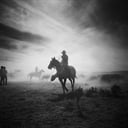In the Cub Scout oath that was retired June 1, 2015, the scout obeys the Law of Pack and follows whom?
In 1914 Robert Baden-Powell, a Lt. Gen. in the British Army and the inspiration for the scouting movement, announced a Junior Section for Scouting. In 1916, he published his own outlines for such a scheme to be called Wolf Cubbing. Baden-Powell may have had a number of reasons to call this section Wolf Cubs. "Wolf" was one of the ranks some Native American tribes gave to their best scouts. By analogy, a young boy, not old enough to be a wolf or true Scout, could be a baby wolf or Wolf Cub.
Baden-Powell asked his friend Rudyard Kipling for the use of his Jungle Book history and universe as a motivational frame in cub scouting. Baden-Powell wrote a new book, The Wolf Cub's Handbook, for junior members. In 1917, junior members became known as Wolf Cubs.
The Scout Promise and Law of the Pack were retired in June, 2015 and replaced by a new oath.
In The Jungle Book, Akela (which means single or solitary in Hindi) was the leader of the Seeonee pack of Indian wolves and presides over the pack's council meetings.
In Cub Scout packs Akela was the symbol of wisdom, leadership and authority, anybody who the scout looks upon as a leader. This could be the scout master, cub master, den leader, teacher, coach, clergy...anyone. At home, the parents fill this role.
More Info:
en.wikipedia.org


